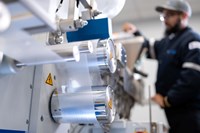Plating Q&A: Low Stress Nickel Deposit
Plating expert Art Kushner answers a question about parts that specify a “low stress” nickel deposit, and whether there are numerical ranges for high- and low- stress nickel deposits.
.jpg;maxWidth=600)
Question: We receive parts that specify a “low stress” nickel deposit. Are there numerical ranges for high- and low- stress nickel deposits? D. M.
Answer: I am not aware of any standard that specifies numeric values for high and low stress deposits. Perhaps one of our readers can enlighten us on this. That said, let's talk about stress in nickel deposits. Residual stress in nickel deposits is affected by the plating bath composition. The table below shows some stress values.
| Solution Anion | Residual Stress (psi) |
| Sulfamate | 8,600 |
| Sulfate | 23,100 |
| Chloride | 33,000 |
Typically, sulfamate nickel is called for when a low-stress deposit is specified. The conventional Watts nickel bath, which contains sulfate and chloride, gives a deposit with a high-residual stress. Adding stress reducing agents to the plating bath can reduce this stress. In some cases, this is satisfactory but if an additive-free deposit is required, you will have to think in terms of the sulfamate plating bath.
Other factors will influence the residual stress of the deposit like temperature of the plating bath and the actual substrate itself.
A much more detailed discussion of stress and plated deposits can be found in the book, Electrodeposition – The Materials Science of Coatings and Substrates by Jack Dini. The book is available from Metal Finishing Publications, (212) 633-3199.
To read more answers by Art Kushner, please click here
Related Content
-
Possibilities From Electroplating 3D Printed Plastic Parts
Adding layers of nickel or copper to 3D printed polymer can impart desired properties such as electrical conductivity, EMI shielding, abrasion resistance and improved strength — approaching and even exceeding 3D printed metal, according to RePliForm.
-
Products Finishing Reveals 2023 Qualifying Top Shops
Each year PF conducts its Top Shops Benchmarking Survey, offering shops a tool to better understand their overall performance in the industry. The program also recognizes shops that meet a set of criteria to qualify as Top Shops.
-
3 Tests to Ensure Parts are Clean Prior to Plating
Making sure that all of the pre-processing fluids are removed prior to plating is not as simple as it seems. Rich Held of Haviland Products outlines three tests that can help verify that your parts are clean.















